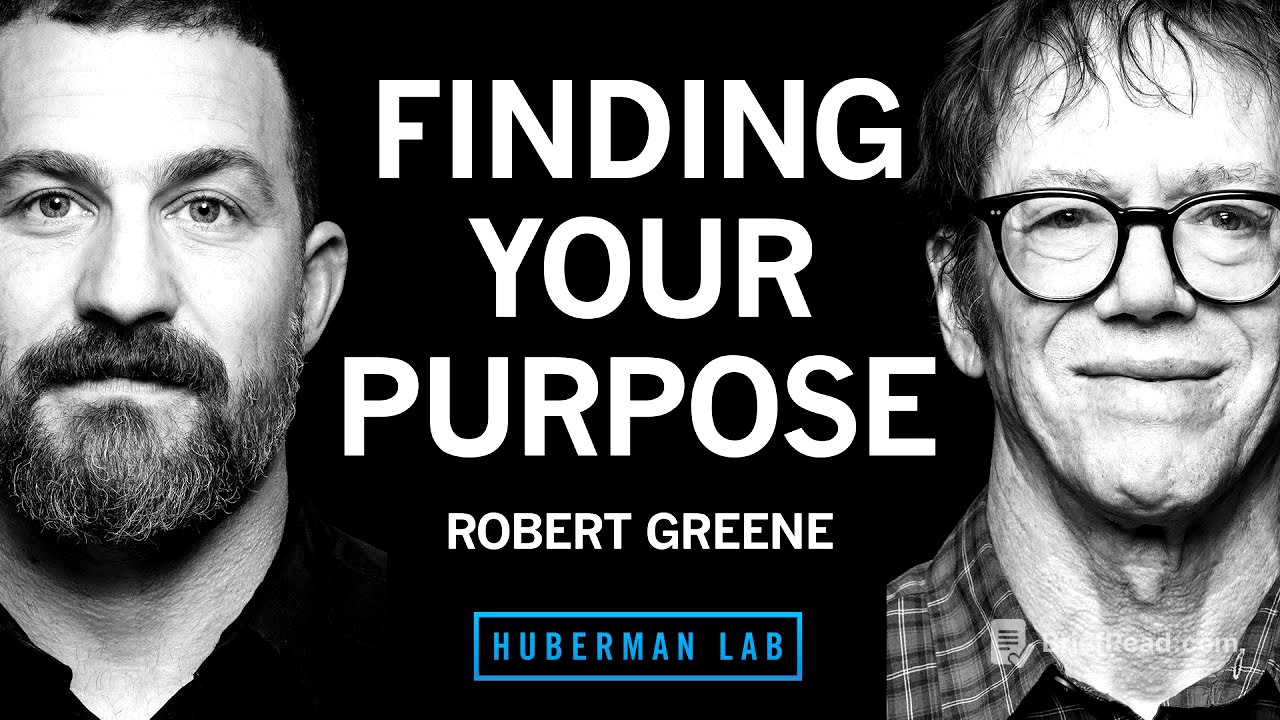TLDR;
In this Huberman Lab podcast episode, Andrew Huberman interviews author Robert Greene about finding purpose, navigating relationships, understanding power dynamics, and the importance of self-awareness. They discuss how childhood experiences can guide one's purpose, the role of vulnerability in relationships, and how to manage anxiety to foster creativity and critical thinking. Greene also shares his personal experiences following a stroke and how it shifted his perspective on life.
- Finding purpose through childhood interests and emotional engagement.
- Understanding power dynamics and vulnerability in relationships.
- Managing anxiety to foster creativity and critical thinking.
- Appreciating life and the human brain's potential for plasticity.
Robert Greene [0:00]
Andrew Huberman introduces Robert Greene, author of bestselling books like "The 48 Laws of Power" and "Mastery". Huberman expresses gratitude for Greene's book "Mastery," which profoundly impacted his life by embedding the idea that everyone has a deeper purpose and explaining how to find it.
Sponsors: ROKA, Helix Sleep & Waking Up [1:58]
Huberman thanks the sponsors of the podcast: ROKA (eyeglasses and sunglasses), Helix Sleep (mattresses and pillows), and Waking Up (meditation app). He briefly explains how each product supports mental and physical health.
Mastery (The Book), Purpose [5:56]
Huberman shares a story about recommending Greene's "Mastery" to his undergraduate students, emphasizing its transformative insights on learning, mentorship, and identifying one's unique purpose. He credits "Mastery" with inspiring his podcast by reinforcing the idea that everyone has a deeper purpose and explaining how to find it.
Finding Purpose, Childhood, Learning & Emotional Engagement [8:26]
Greene explains that finding one's purpose, or "life's task," provides direction and focus, making life more exciting and manageable. He emphasizes that everyone is unique, with DNA and life experiences that have never occurred before and will never occur again. This uniqueness is a source of power that should be embraced. Greene advises listeners to recall their childhood impulse voices, which reveal early passions and interests. He recommends Howard Gardner's "Five Frames of Mind," which talks about different forms of intelligence (verbal, abstract, kinetic, social, etc.) and how the brain naturally leans towards one or two of them.
Early Interests, Delight & Discovery [18:00]
Greene illustrates how early interests, like Albert Einstein's fascination with a compass or Steve Jobs's captivation with technological devices, can indicate a person's path. He notes that as people grow older, they often lose touch with these inner voices due to external pressures from teachers, parents, and peers. This can lead to confusion and a lack of direction in college and career choices. Greene stresses that emotional engagement is crucial for learning and achieving mastery.
Love vs. Hate Experiences & Learning [22:50]
Greene explains that both positive and negative experiences can shape one's path. However, it's important for children to have positive experiences early on to foster a love of learning and discipline. He shares his own experiences of disliking journalism and Hollywood, which helped him realize he wanted to be a writer.
Self-Awareness, Frustration, Excitation [28:25]
Huberman and Greene discuss the importance of self-awareness in adulthood. Frustration and anxiety are signals that one is not on the right path. Paying attention to these emotions and understanding their origins is key to returning to one's childhood inclinations.
Sponsor: AG1 [31:47]
Huberman briefly thanks AG1, a nutritional supplement, for sponsoring the podcast. He mentions that AG1 provides foundational nutritional needs, including vitamins, minerals, probiotics, and fiber.
Sublime Experiences, Real vs. False; Authenticity & Time [33:18]
Huberman and Greene discuss the concept of sublime experiences, differentiating between real and false forms. Greene defines the sublime as what lies just outside the circle of societal conventions, offering a sense of transcendence. Real sublime experiences come from within, such as near-death experiences, while false sublime experiences are external, like drugs or online rage. Greene connects the sublime to finding authentic seeds within oneself, as opposed to being misled by distracting emotions. He also touches on the idea that addictive behaviors are attempts to "murder time" and avoid mortality.
Power & Relationships; Purpose & Mastery [43:57]
Huberman and Greene shift the discussion to power, defining it as the degree of control one has over their environment and relationships. Greene emphasizes that everyone has a need for power and influence, but it's important to exercise it subtly and ethically. He explains that power dynamics are always at play in social and professional interactions, and understanding these dynamics is essential for navigating the world effectively.
Seduction, Vulnerability, Childhood [55:51]
Greene discusses seduction, explaining that it involves vulnerability and a willingness to let someone "under our skin." He suggests that seduction has roots in early childhood experiences and taboos. He emphasizes that being vulnerable is a positive trait, allowing for deeper connections and influence.
Sponsor: InsideTracker [1:07:04]
Huberman briefly thanks InsideTracker, a personalized nutrition platform, for sponsoring the podcast. He mentions that InsideTracker analyzes blood and DNA data to provide personalized health recommendations.
Power Dynamics & Romance; Equality, Love Sublime & Connection [1:08:05]
Huberman and Greene explore power dynamics in romantic relationships, including the concept of "topping from the bottom." Greene suggests that the art of seduction was invented by women who lacked social and political power, using it as a means of influence. He also introduces the idea of "love sublime," a state of deep connection and equality that transcends power dynamics.
Vulnerability in Relationships, Creativity; Social Media, Justice [1:18:42]
Greene discusses the importance of vulnerability in relationships and creativity, noting that creative people are often highly vulnerable to ideas and the environment. He expresses concern about how social media and hookup culture are rewiring the human brain, making it harder for young people to form deep connections. Huberman and Greene also touch on the negative impact of constant exposure to injustice on social media, which can hijack creativity and prevent a sense of deep love.
Outrage, Control, “Art of Ignore” [1:29:45]
Greene emphasizes the importance of learning what to ignore in modern life, as constant exposure to negative news and social media can be draining and distracting. He suggests channeling dark energy into positive purposes, such as organizing or creating art.
Masculinity & Femininity [1:33:50]
Greene discusses the confusion surrounding masculinity and femininity in modern society. He suggests that there is a need for positive models of both, emphasizing inner strength and resilience for men and competence and expertise for women.
Picking Role Models; Purpose & Mentor Relationship [1:42:16]
Huberman and Greene discuss the importance of picking role models and mentors, emphasizing that it's an ongoing process throughout life. Greene stresses that a mentor relationship takes work and courage, requiring one to actively engage with another human being.
“Alive” Thinking; Anxiety & Creativity [1:51:07]
Greene introduces the concept of "alive thinking," which involves absorbing ideas, reflecting on them, and transforming them into something new. He emphasizes that anxiety can prevent people from engaging in this process, leading them to glom onto easy answers. He suggests that the ability to manage anxiety is crucial for creativity and success.
Convergent Interests & Romantic Relationships [1:58:55]
Huberman and Greene discuss the importance of convergent interests in romantic relationships, emphasizing that these interests should go beyond superficial preferences and tap into deeper values and character traits. Greene shares a story about how his love of cats helped him connect with his wife.
Self-Awareness, Core Values & Romantic Relationships [2:07:19]
Greene emphasizes that self-awareness is essential for finding the right partner, as it allows one to determine if someone else's character is a good match. He also notes the importance of observing a person's behavior in different contexts to see their true character.
Non-Verbal Communication & Relationships [2:15:27]
Greene discusses the importance of non-verbal communication in relationships, noting that humans are wired to pick up on subtle cues and signals. He suggests shutting off the words and paying attention to body language, facial expressions, and tone of voice.
Eyes, Voice, Intuition & Seduction [2:24:58]
Greene emphasizes the importance of paying attention to the eyes, noting that "dead eyes" can be a sign of a toxic person. He also discusses the power of a woman's voice in seduction, as it can evoke memories of early childhood and maternal comfort.
Virtual World, Social Skills, Non-Verbal Communication [2:28:38]
Huberman and Greene discuss how the virtual world can hinder the development of social skills and non-verbal communication abilities. Greene emphasizes the importance of real-world interactions for mastering these skills.
Self-Awareness & Intelligence, Artificial Intelligence (AI), Nuance [2:32:19]
Greene expresses concern about the potential negative impacts of AI, arguing that it could deaden critical thinking and self-awareness. He emphasizes the importance of developing the human brain's capacity for anxiety, self-awareness, and holistic thinking.
Human Brain, Plasticity [2:41:43]
Greene emphasizes the importance of worshipping the human brain, which he calls the greatest creation in the universe. He highlights the brain's plasticity and its capacity for immense learning and growth throughout life.
Stroke & Near-Death Experiences, Self, Time [2:45:18]
Greene shares his personal experience of having a stroke, describing the strange visions and sensations he experienced during his reemergence to consciousness. He notes that the stroke taught him about the illusory nature of the self and the importance of appreciating life.
Appreciation & Near-Death Experience, Urgency [2:55:49]
Greene emphasizes that his near-death experience taught him to appreciate the simple things in life and to live with a sense of urgency. He encourages listeners to not take their lives for granted.
“Death Ground” & Urgency [3:01:36]
Greene introduces the concept of "death ground," a strategy from his book "33 Strategies of War," which involves putting oneself in a situation where one must either win or die. He explains that this can create a sense of urgency and focus that allows one to achieve great things.
Zero-Cost Support, Spotify & Apple Reviews, Sponsors, YouTube Feedback, Momentous, Social Media, Neural Network Newsletter [3:09:13]
Huberman thanks listeners for their support and encourages them to subscribe to the podcast on YouTube, Spotify, and Apple. He also thanks the sponsors and encourages listeners to check them out. He provides information about his social media channels and the neural network newsletter.









